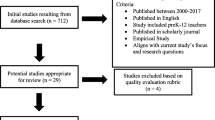Abstract
The purpose of this study was to identify beginner teachers’ sources of knowledge for teaching literature in the English Second Language (ESL) classroom. A review of the literature on ESL teachers’ knowledge indicated a paucity of studies that focus specifically on teaching knowledge for Literature as a stand-alone subject in ESL. In addition, ESL teacher training in most countries seemingly focuses on preparing pre-service teachers for language teaching rather than literature. To identify the sources of teaching knowledge for Literature teachers, this study adopted an interpretivist epistemological worldview and used a qualitative single case study design. Data were collected using non-participant observations and semi-structured interviews from four purposively selected Literature in English beginner teachers. Quality and ethical considerations were upheld in this study using a number of strategies. Inductive thematic analysis was used for data analysis. The analysis resulted in three sources of ESL Literature teaching, namely, theory of language education, the nature of the subject and problematic areas in Literature teaching. The findings may be of benefit to ESL teacher preparation programmes which could use them to provide pre-service teachers with multiple contexts as sources of teaching knowledge.
本研究旨在發現新手教師在英語為第二語言教室的文學教學知識來源。根據以英語為第二語言教師知識的文獻回顧, 發現在文獻上, 缺乏以英語為第二語言的文學教學知識之獨立學科研究。在大部分的國家, 以英語為第二語言的教師培訓似乎著重於職前教師的語言教學, 而非文學教學。為了發現文學教師的教學知識來源, 本研究採用詮釋主義的認識論觀點及質性單一個案研究設計。研究資料蒐集使用非參與觀察研究以及半結構式訪談等方法。然後, 選出四名英語文學教學的新手教師來進行訪談。本研究使用許多策略來維持品質和倫理的考量。研究資料分析採用歸納主題分析法。最後本研究獲致了以下三項以英語為第二語言文學教學的知識來源:一、語言教育理論; 二、學科性質; 三、文學教學的相關問題。上述研究結果將有利於以英語為第二語言的教師預備課程; 進而提供職前教師多樣性背景為教學知識來源。
Similar content being viewed by others
References
Bowen, G. A. (2009). Document analysis as a qualitative research method. Qualitative Research Journal, 9(2), 27–40.
Braun, V., & Clarke, V. (2006). Using thematic analysis in psychology. Qualitative Research in Psychology, 3(2), 77–101.
Buitink, J. (2009). What and how do student teachers learn during school-based teacher education? Teaching and Teacher Education, 25(1), 118–127.
Calderhead J. 1996. Teachers: beliefs and knowledge. Retrieved 12, December 2016, from www.psycnet.apa.org.
Cheng, M. M., Tang, S. Y., & Cheng, A. Y. (2012). Practicalising theoretical knowledge in student teachers’ professional learning in initial teacher education. Teaching and Teacher Education, 28(6), 781–790.
Connelly, F. M., Clandinin, D. J., & He, F. (1997). Teachers’ personal practical knowledge on the professional knowledge landscape. Teaching and Teacher Education, 13(7), 665–674.
Creswell, J. W. (2009). Research design: qualitative, quantitative, and mixed methods approaches (3rd ed.). Thousand Oaks: Sage.
Creswell, J. W. (2013). Qualitative inquiry and research design: choosing among five approaches (3rd ed.). Thousand Oaks: Sage.
DeGraff, T. L., Schmidt, C. M., & Waddell, J. H. (2015). Field-based teacher education in literacy: preparing teachers in real classroom contexts. Teaching Education, 26(2), 1–17.
DiYanni, R. (2000). Literature: reading fiction, poetry, and drama. Columbus: McGraw-Hill Education.
Elbaz, F. (1983). Teacher thinking: a study of practical knowledge. London: Croom Helm.
Fleming, M. P., & Strevens, D. (2015). English teaching in secondary schools: linking theory and practices (4th ed.). London: Routledge.
Giovanelli, M. (2015). Becoming an English language teacher: linguistic knowledge, anxieties and the shifting sense of identity. Language and Education, 29(5), 416–429.
Gordon, J. (2012). More than canons: teacher knowledge and the literary domain of secondary English curriculum. Educational Research, 54(4), 375–390.
Grossman, P., Hammerness, K., & McDonald, M. (2009). Redefining teaching, re-imagining teacher education. Teachers and Teaching: Theory and Practice, 15(2), 273–289.
Grossman, P., & McDonald, M. (2008). Back to the future: directions for research in teaching and teacher education. American Educational Research Journal, 45(2), 184–205.
Hegarty, S. (2000). Teaching as a knowledge-based activity. Oxford Review of Education, 26(4), 451–465.
Kanyongo, G. Y. (2005). Zimbabwe’s public education system reforms: successes and challenges. International Education Journal, 6(1), 65–74.
Lampert, M. (2010). Learning teaching in, from, and for practice: what do we mean? Journal of Teacher Education, 61(1), 21–34.
Marshall, C., & Rossman, G. B. (2010). Designing qualitative research. Thousand Oaks: Sage.
Mertens, D. M. (2014). Research and evaluation in education and psychology: integrating diversity with quantitative, qualitative, and mixed methods (4th ed.). Thousand Oaks: Sage.
McGlynn-Stewart, M. (2015). From student to beginning teacher: learning strengths and teaching challenges. Cogent Education, 2(1), 1–18.
Nagamine, T. (2007). Reconceptualising teacher knowledge and belief based on social constructivism. Journal of the Faculty of Letters, Prefectural University of Kumamoto, 13(66), 1–13.
Nieuwenhuis, J. (2007). Analysing qualitative data. In K. Maree (Ed.), First steps in research (pp. 98–122). Pretoria: Van Schaik.
Olivero, M. M. (2015). Multilingualism in an EFL practicum: increasing student teachers’ pedagogical knowledge. TESOL Journal, 6(2), 382–404.
Schön, D. A. (1983). The reflective practitioner: how professionals think in action. London: Basic Books.
Shenton, A. K. (2004). Strategies for ensuring trustworthiness in qualitative research projects. Education for Information, 22(2), 63–75.
Shulman, L. S. (1986). Those who understand: knowledge growth in teaching. Educational Researcher, 15(2), 4–14.
Shulman, L. S. (1987). Knowledge and teaching foundations of the new reform. Harvard Educational Review, 57, 1–23.
Shulman, L. S., & Shulman, J. H. (2004). How and what teachers learn: a shifting perspective. Journal of Curriculum Studies, 36(2), 257–271.
Suter, W. N. (2006). Introduction to educational research: a critical thinking approach. Thousand Oaks, CA: Sage.
Turner-Bisset, R. (1999). The knowledge bases of the expert teacher. British Educational Research Journal, 25(1), 39–55.
Uzun, L. (2016). Evaluation of the latest English language teacher training programme in Turkey: teacher trainees’ perspective. Cogent Education, 3(1), 1147–1165.
Yin, R. K. (2014). Case study research: design and methods (5th ed.). Thousand Oaks, CA: Sage.
Zimbabwean Ordinary Level Literature Syllabus (2013). Retrieved on 7, December 2015, from http://www.mopse.gov.zw/index.php/o-level?download=227:o-level-english-literature-pdf
Author information
Authors and Affiliations
Corresponding author
Rights and permissions
About this article
Cite this article
Mpofu, N., de Jager, L. Exploring Beginner Teachers’ Sources of Knowledge for Teaching Literature in ESL Classrooms. English Teaching & Learning 42, 57–73 (2018). https://doi.org/10.1007/s42321-018-0003-7
Published:
Issue Date:
DOI: https://doi.org/10.1007/s42321-018-0003-7




